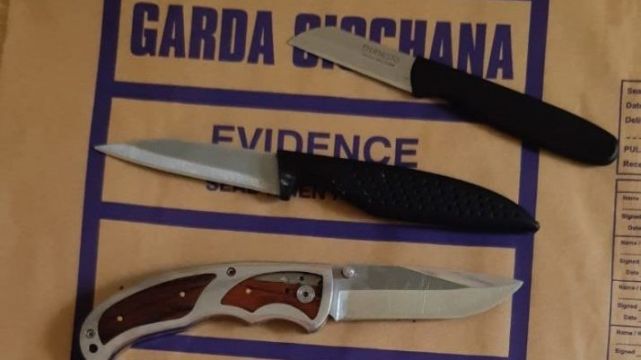Concern has been expressed about the scale of knife crime across the country after new figures revealed that an annual average of over 2,100 knives have been confiscated from suspects over the past five years.
Figures published by the Department of Justice show more than 18,000 knives have been seized nationally over the past decade.
The annual figures show a strong upward trend, rising from 1,344 in 2014 to a peak of 2,260 in 2020.
Last year’s total number of seizures at 2,186 was the second-highest annual total in the past decade.
They included a record 285 seized in the Dublin North Central division which covers the north inner city – the largest quantity confiscated in any Garda division in a single year.
Approximately 45% of all knives are taken from suspects detained across the six Garda divisions in Dublin.
Other divisions with high levels of seizures over the past decade are Louth/Cavan/Monaghan (1,183); Cork City (1,036), Waterford/Kilkenny/Carlow (958) and Limerick (858).
The lowest total of knives seized was in the Cork West division at 165.
So far in 2024, complete figures for 15 of the 23 Garda divisions nationwide show the high confiscation rate is continuing with 432 knives seized up to March 20.
They include 74 in each of the two divisions covering Dublin city centre.
Smaller quantities of 10 or fewer knives were seized in the other eight divisions, including Dublin East, Laois/Offaly, Wexford, Wicklow, Sligo/Leitrim, Cork North, Cork East and Kerry.
Outside the capital, the largest number of knives seized so far in 2024 was in Limerick with 32.
The figures were released as part of a parliamentary question submitted by Social Democrats TD, Catherine Murphy.
The Kildare North deputy said the quantity of knives being seized in every part of the country was “a cause for concern”, including 475 across both constituencies in Kildare over the past 10 years.
“Current penalties on conviction for the possession of an offensive weapon such as a knife without a justifiable reason appear not to be deterrent enough,” said Ms Murphy.
She expressed hope that the Taoiseach, Simon Harris, would deliver on the promise made in his first address to the Dáil as leader of the Government last week to bring forward “new measures to increase the penalties for knife crime and antisocial behaviour.”
Commenting on the figures, the Minister for Justice, Helen McEntee, said everyone was very conscious of the effect that knife crime can have on the quality of life for local communities.
Ms McEntee offered reassurance that the Government was committed to supporting An Garda Síochána to tackle the issue.
“There are many complex, interlinked and variable causes for the use of knives in the commission of offences,” the minister observed.
“As a result, there are no quick-fix solutions to tackling knife crime. Long-term evidence-based strategies are needed that address knife crime as part of a wider strategic response to anti-social behaviour, street violence, youth offending and domestic violence,” she added.
Ms McEntee pointed out that an expert forum on anti-social behaviour, which was established in 2020, was examining a broad range of issues with a focus on developing measures which will counteract the negative impact of anti-social behaviour on community morale and the quality of life.
She said the forum had set up four sub-groups, including one relating specifically to knife crime.
The minister said she intended to bring proposals on the issue to Government “in the near future.”







